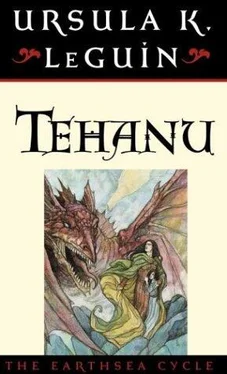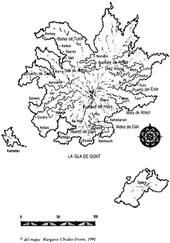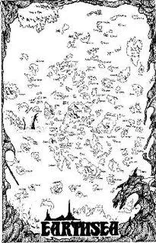Ursula Le Guin - Tehanu The Last Book of Earthsea
Здесь есть возможность читать онлайн «Ursula Le Guin - Tehanu The Last Book of Earthsea» весь текст электронной книги совершенно бесплатно (целиком полную версию без сокращений). В некоторых случаях можно слушать аудио, скачать через торрент в формате fb2 и присутствует краткое содержание. Город: New York, Год выпуска: 1990, Издательство: Atheneum, Жанр: Фэнтези, на английском языке. Описание произведения, (предисловие) а так же отзывы посетителей доступны на портале библиотеки ЛибКат.
- Название:Tehanu The Last Book of Earthsea
- Автор:
- Издательство:Atheneum
- Жанр:
- Год:1990
- Город:New York
- ISBN:нет данных
- Рейтинг книги:4 / 5. Голосов: 1
-
Избранное:Добавить в избранное
- Отзывы:
-
Ваша оценка:
- 80
- 1
- 2
- 3
- 4
- 5
Tehanu The Last Book of Earthsea: краткое содержание, описание и аннотация
Предлагаем к чтению аннотацию, описание, краткое содержание или предисловие (зависит от того, что написал сам автор книги «Tehanu The Last Book of Earthsea»). Если вы не нашли необходимую информацию о книге — напишите в комментариях, мы постараемся отыскать её.
Tehanu The Last Book of Earthsea — читать онлайн бесплатно полную книгу (весь текст) целиком
Ниже представлен текст книги, разбитый по страницам. Система сохранения места последней прочитанной страницы, позволяет с удобством читать онлайн бесплатно книгу «Tehanu The Last Book of Earthsea», без необходимости каждый раз заново искать на чём Вы остановились. Поставьте закладку, и сможете в любой момент перейти на страницу, на которой закончили чтение.
Интервал:
Закладка:
They lay in warmth and sweet silence.
“Tell me something.”
He murmured assent sleepily.
“How did you happen to hear what they were saying? Hake and Handy and the other one. How did you happen to be just there, just then?”
He raised himself up on one elbow so he could look at her face. His own face was so open and vulnerable in its ease and fulfillment and tenderness that she had to reach up and touch his mouth, there where she had kissed it first, months ago, which led to his taking her into his arms again, and the conversation was not continued in words.
There were formalities to be got through. The chief of them was to tell Clearbrook and the other tenants of Oak Farm that she had replaced “the old master” with a hired hand. She did so promptly and bluntly. They could not do anything about it, nor did it entail any threat to them. A widow’s tenure of her husband’s property was contingent on there being no male heir or claimant. Flint’s son the seaman was the heir, and Flint’s widow was merely holding the farm for him. If she died, it would go to Clearbrook to hold for the heir; if Spark never claimed it, it would go to a distant cousin of Flint’s in Kahedanan. The two couples who did not own the land but held a life interest in the work and profit of the farming, as was common on Gont, could not be dislodged by any man the widow took up with, even if she married him; but she feared they might resent her lack of fidelity to Flint, whom they had after all known longer than she had. To her relief they made no objections at all. “Hawk” had won their approval with one jab of a pitchfork. Besides, it was only good sense in a woman to want a man in the house to protect her. If she took him into her bed, well, the appetites of widows were proverbial. And, after all, she was a foreigner.
The attitude of the villagers was much the same. A bit of whispering and sniggering, but little more. It seemed that being respectable was easier than Moss thought; or perhaps it was that used goods had little value.
She felt as soiled and diminished by their acceptance as she would have by their disapproval. Only Lark freed her from shame, by making no judgments at all, and using no words-man, woman, widow, foreigner-in place of what she saw, but simply looking, watching her and Hawk with interest, curiosity, envy, and generosity.
Because Lark did not see Hawk through the words herdsman, hired hand, widow’s man, but looked at him himself, she saw a good deal that puzzled her. His dignity and simplicity were not greater than that of other men she had known, but were a little different in quality; there was a size to him, she thought, not height or girth, certainly, but soul and mind. She said to Ivy, “That man hasn’t lived among goats all his life. He knows more about the world than he does about a farm.”
“I’d say he’s a sorcerer who’s been accursed or lost his power some way,” the witch said. “It happens.”
“Ah,” said Lark.
But the word “archmage” was too great and grand a word to bring from far-off pomps and palaces and fit to the dark-eyed, grey-haired man at Oak Farm, and she never did that. If she had, she could not have been as comfortable with him as she was. Even the idea of his having been a sorcerer made her a bit uneasy, the word getting in the way of the man, until she actually saw him again. He was up in one of the old apple trees in the orchard pruning out deadwood, and he called out a greeting to her as she came to the farm. His name fit him well, she thought, perched up there, and she waved at him, and smiled as she went on.
Tenar had not forgotten the question she had asked him on the hearthstones under the sheepskin coat. She asked it again, a few days or months later-time went along very sweet and easy for them in the stone house, on the winterbound farm. “You never told me," ‘ she said, “how you came to hear them talking on the road.”
“I told you, I think. I’d gone aside, hidden, when I heard
“Why?”
“I was alone, and knew there were some gangs around.”
“Yes, of course- But then just as they passed, Hake was talking about Therru?”
“He said ‘Oak Farm,’ I think.”
“It’s all perfectly possible. It just seems so convenient.” Knowing she did not disbelieve him, he lay back and waited .
“It’s the kind of thing that happens to a wizard,” she said.
“And others.”
“Maybe.”
“My dear, you’re not trying to . . . reinstate me?”
“No. No, not at all. Would that be a sensible thing to do? If you were a wizard, would you be here?”
They were in the big oak-framed bed, well covered with sheepskins and feather-coverlets, for the room had no fireplace and the night was one of hard frost on fallen snow.
“But what I want to know is this. Is there something besides what you call power-that comes before it, maybe? Or something that power is just one way of using? Like this. Ogion said of you once that before you’d had any learning or training as a wizard at all, you were a mage. Mage-born, he said. So I imagined that, to have power, one must first have room for the power. An emptiness to fill. And the greater the emptiness the more power can fill it. But if the power never was got, or was taken away, or was given away-still that would be there.”
“That emptiness,” he said.
“Emptiness is one word for it. Maybe not the right word.”
“Potentiality?” he said, and shook his head. “What is able to be . . . to become.”
“I think you were there on that road, just there just then, because of that-because that is what happens to you. You didn’t make it happen. You didn’t cause it. It wasn’t because of your ‘power.’ It happened to you. Because of your emptiness.”
After a while he said, “This isn’t far from what I was taught as a boy on Roke: that true magery lies in doing only what you must do. But this would go further. Not to do, but to be done to. . . .
“I don’t think that’s quite it. It’s more like what true doing rises from. Didn’t you come and save my life-didn’t you run a fork into Hake? That was ‘doing,’ all right, doing what you must do. . . ."
He pondered again, and finally asked her, “Is this a wisdom taught you when you were Priestess of the Tombs?"
“No.” She stretched a little, gazing into the darkness. “Arha was taught that to be powerful she must sacrifice. Sacrifice herself and others. A bargain: give, and so get. And I cannot say that that’s untrue. But my soul can’t live in that narrow place-this for that, tooth for tooth, death for life. . . . There is a freedom beyond that. Beyond payment, retribution, redemption-beyond all the bargains and the balances, there is freedom.”
“The doorway between them," he said softly.
That night Tenar dreamed. She dreamed that she saw the doorway of the Creation of E`a, It was a little window of gnarled, clouded, heavy glass, set low in the west wall of an old house above the sea. The window was locked, It had been bolted shut. She wanted to open it, but there was a word or a key, something she had forgotten, a word, a key, a name, without which she could not open it. She sought for it in rooms of stone that grew smaller and darker till she found that Ged was holding her, trying to wake her and comfort her, saying, “It’s all right, dear love, it will be all right!" ‘ ‘
“I can’t get free!” she cried, clinging to him.
He soothed her, stroking her hair; they lay back together, and he whispered, “Look.”
The old moon had risen. Its white brilliance on the fallen snow was reflected into the room, for cold as it was Tenar would not have the shutters closed. All the air above them was luminous. They lay in shadow, but it seemed as if the ceiling were a mere veil between them and endless, silver, tranquil depths of light.
Читать дальшеИнтервал:
Закладка:
Похожие книги на «Tehanu The Last Book of Earthsea»
Представляем Вашему вниманию похожие книги на «Tehanu The Last Book of Earthsea» списком для выбора. Мы отобрали схожую по названию и смыслу литературу в надежде предоставить читателям больше вариантов отыскать новые, интересные, ещё непрочитанные произведения.
Обсуждение, отзывы о книге «Tehanu The Last Book of Earthsea» и просто собственные мнения читателей. Оставьте ваши комментарии, напишите, что Вы думаете о произведении, его смысле или главных героях. Укажите что конкретно понравилось, а что нет, и почему Вы так считаете.








